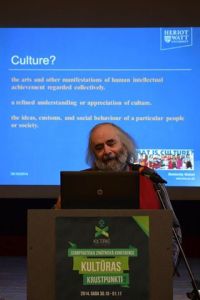by Cristina Clopot
Last Sunday was a day of passionate discussions at the Storytelling Centre in Edinburgh. What’s next for Scotland’s culture? This was the central question posed by a group of cultural activists in an event organized under the umbrella of the festival TradFest. The event, coordinated by cultural activist Mairi McFadyen, with the help of Roanne Dods, was structured based on the world café model. A massive task of discussing the current situation and future possibilities was set at the start of the day.
First, a round of cultural actors from different domains shared their views on the current situation culture taking into account, among others, the recent political elections and last year’s referendum. Their aim was to provoke and raise some general ideas. The first panel included David Grieg (playwright), Adura Onashile (actress), Kieran Hurley (writer), Scott Hames (academic), Gerda Stevenson (actress, writer), Aonghas MacNeacail (poet) and Donald Smith (director – Storytelling Centre). Each of them delivered serious, funny, personal and general comments on their craft and the general landscape of culture in Scotland. The themes discussed included:
- a personal list published here which mentions amongst others the use of plural when discussing culture (David Grieg);
- HIFA festival in Zimbabwe as an example of an event embracing diversity (Adura Onashile);
- That art can be ‘a hammer with which to shape’ reality (Kieran Hurley);
- the interplay between politics and culture – the outlines of the current situation when culture is arrière-garde rather than avant-garde of politics (Scott Hames);
- the beauty and richness of expression of Scots language (Gerda Stevenson)
- speakers of heritage languages such as Scots and Gaelic and prejudices against their use (Aonghas MacNeacail)
- culture’s effects such as encouraging human connections, the link between culture and heritage, and a need for inclusion in international debates around heritage (Donald Smith).
For further details on each ‘provocation’ please see #ForCulture on Twitter.
I had the pleasure of participating in a group where interesting and active discussions took place. We discussed about the link between culture and heritage and how this link can be seen both in a positive light (based on the emphasis that Scotland places on heritage and and its potential to assist cultural project through association) as well as a negative one (heritage perceived only as bricks and stones). The power of culture and arts to educate was also debated, as well as the need for further inclusion (as art can be perceived, at times, as elitist). A further point, later on resumed by other groups also, was that culture needs to be sensitive to diversity and multiculturalism.
The second round of provocations came after this and new ideas about potential ideas for development emerged:
- Karine Polwart (songwriter) called for embracing difficult heritage also and the need to have conversations beyond the group of like-minded people;
- Mara Menzies (storyteller) mentioned the need for a new narrative of Scotland, one that presents the stories of women also;
- Tam Dean Burn (actor) discussed about politics and women and made the audience sing along with him Freedom Come All Ye;
- Peter Arnott (playwright) discussed about the link between culture and identity and how identities are sometimes discussed in relation to the ‘Other’ (often by negation);
- Janie Nicoll (visual artist) presented her experience at the Venice Biennale and raised the problem of artists’ wages;
- Christopher Silver (journalist) reminded us about the power of narratives and their transformative effects;
- Janice Galloway (writer) talked about the need for people to understand the value of culture and reminded us that artistic products cannot be prescribed through business plans.
Inspired by these inspiring ‘provocations’ we re-joined our groups to discuss ways of moving forward. The discussions in my group concentrated on 5 key terms:
- untapped – as there is an immense potential not used, we are at a moment of opportunity
- outward – the need to embrace diversity but also look outside to the world
- broadcasting – a need for better coverage of culture on major broadcasting media
- lifelong – linked with education – as a commitment for development of the individual throughout life
- action/conversation – the need to involve in the discussion not only creators of art, but also different stakeholders such as policy makers, etc.
Other groups mentioned ideas such as understanding culture as a process and not a product, the possibility of a tax-deductible legislation for arts, creation of a manual of activism, the need to make public servants and educator aware of culture’s value. David Francis encouraged people in the audience to act as ‘bards’ of culture. Avenues for further development of this effort to reconfigure the current cultural landscape were also discussed building on the conclusions of the day. Further plans included possibilities to form a community as well as organising other meetings.
For further details about the event visit the project’s website and Twitter.

